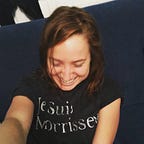The Relationship Between Autism and Self-doubt
How do you form a sense of self when you constantly interrogate who you are?
Recently I have begun learning about the autistic struggle for self, and it is making a lot of sense to me.
My life has been defined by self-doubt. Endless self-interrogation taking the joy from new relationships and jobs alike. Do o really like them? Is this job the best possible use of my skillset/limited time on earth?
Self-doubt has also made endings incredibly difficult — how do you know when something is really over? I have found myself feeling trapped in relationships, jobs and living situations that aren’t working many times in my life.
Considering topics I care about it’s rare that I arrive at a conclusion. Every opinion is pending more information. I am an eternal fence sitter. A constant bet-hedger.
With a questioning, doubting nature like this, it makes sense that forming a sense of self would be difficult.
What even is a self anyway?
Wikipedia defines it as:
“The self is an individual person as the object of its own reflective consciousness. Since the self is a reference by a subject to the same subject, this reference is necessarily subjective.”
